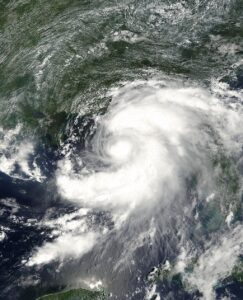FAA Warns Drone Users About Temporary Flight Restriction for Tropical Storm Barry
The FAA is reminding drone pilots not actively involved in disaster response efforts to respect the temporary flight restriction (TFR) in place around Tropical Storm Barry, on the coastal regions of Mississippi and Louisiana.
While drones have proven to be an invaluable tool in storm recovery, in order to allow the coordinated response effort to operate smoothly unauthorized pilots should not fly. Authorized drones have been used by federal and local agencies in other storm response efforts for search and rescue, situational awareness for effective operations, and in damage assessment for rebuilding.
The following is taken from an FAA announcement:
Drone Users
The FAA has published a NOTAM related to Tropical Storm Barry for the Coastal Regions of Mississippi and Louisiana.
The NOTAM is valid from Noon CT on July 12 and remains in effect until 8:00 p.m. CT on July 14. A full copy of the NOTAM is available through the FAA’s NOTAM search tool, Number: 9/0238
Drone Pilots must be aware of the following:
- Avoid flying in the area unless conducting an active disaster response or recovery mission.
- The FAA might issue a temporary flight restriction (TFR) in the affected area. Be sure to check for active TFRs if you plan to fly.
- Remember that you cannot fly inside a TFR without FAA approval.
Emergency Operations and Response:
You may be able to get expedited approval to operate in the TFR through the FAA’s
Special Governmental Interest (SGI) process and is outlined in FAA Order JO 7200.23A.
Be aware that significant penalties that may exceed $20,000 if drone operators interfere with emergency response operations. Flying a drone without authorization in or near the disaster area may violate federal, state, or local laws and ordinances, even if a Temporary Flight Restriction (TFR) is not in place. Allow first responders to save lives and property without interference.
IF YOU ARE NOT CERTIFICATED AS A REMOTE PILOT OR DO NOT ALREADY HOLD A COA, YOU CANNOT FLY.
Miriam McNabb is the Editor-in-Chief of DRONELIFE and CEO of JobForDrones, a professional drone services marketplace, and a fascinated observer of the emerging drone industry and the regulatory environment for drones. Miriam has a degree from the University of Chicago and over 20 years of experience in high tech sales and marketing for new technologies.
Email Miriam
TWITTER:@spaldingbarker
Subscribe to DroneLife here.
